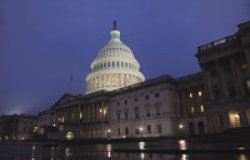The Doha Development Round: Lost in Translation?
Paul Blustein, Journalist in Residence, Global Economy and Development, Brookings Institution; Kent Hughes, Director, Program on America and the Global Economy, Woodrow Wilson Center
Overview
On December 3, 2009, the Wilson Center on the Hill hosted former Washington Post business writer, Paul Blustein, to discuss the future of the Doha Development Round of trade negotiations and its importance within the increasingly globalized economy. Kent Hughes, Director of the Program on America and the Global Economy at the Woodrow Wilson Center, opened with introductory remarks on the relevance and importance of international trade agreements.
Blustein's remarks were based on his most recent book, Misadventures of the Most Favored Nations: Clashing Egos, Inflated Ambitions, and the Great Shambles of the World Trade System, in which he analyzed the history and politics driving trade negotiations. Providing an inside look into the WTO, Blustein detailed the challenges negotiators face in order to achieve the goals that are at the heart of the negotiations.
In addition to articulating the role of the WTO in the global economy, Blustein provided a number of illuminating anecdotes from recent negotiating sessions. One of which occurred in July 2004, when the Doha Round nearly fell apart after trade ministers could not come together on a "Framework Agreement" to provide guidelines for completing the negotiations. According to Bluestein, Robert Zoellick, then U.S. Trade Representative, took the unprecedented step of meeting with ministers one-on-one throughout the night in order to formulate language that each representative could agree upon. In the morning, Zoellick presented the finalized language to the ministers on a "take it or leave it basis." The ministers accepted the new "Framework Agreement," but the negotiations have continued to proceed in fits and starts, and more than five years later there is no end in sight.
For all its faults, however, Blustein asserted the WTO is "a crucial lynchpin of stability in the global economy" and that multi-lateral trade agreements of that sort are critical to the continued development of the global economic system. Bluestein also maintained that the WTO plays a vital role in mitigating country disputes to avoid futile "tit-for-tat trade wars." However, he also emphasized that if the WTO cannot adapt to modern changes, its power and ability to enforce trade rules will atrophy. In order for the WTO to be at its most effective, Blustein argued that WTO rules must be able to protect smaller countries while still enforcing rules equitably across borders regardless of the relative strength of the disputants.
Blustein then enumerated many reasons for the lack of progress throughout the negotiations. He described how the United States farm bill in 2002 raised doubts among its potential trading partners about "America's willingness to limit agricultural subsidies." He asserted that the Bush Administration's decision to remove Rob Portman from his position as U.S. Trade Representative in 2006 was seen by the other parties to the negotiations as signifying a shift of Bush Administration priorities away from the Doha Round. Furthermore, Blustein criticized the strategy of competitive liberalization that the U.S. advocated in which bilateral trade agreements were seen as a stimulus to multilateral agreements. Similarly, Blustien claimed that the European Union "played hardball" in 2005 in regards to opening up agricultural markets, which effectively stalled negotiations for a year. He also noted that emerging market countries such as India, China and Brazil have at various times throughout the negotiations demanded reductions in subsidies among developed nations while being unprepared to concede anything themselves.
Blustein concluded by suggesting that the U.S. could improve its own trade policies for developing countries by adopting a unified, comprehensive system of trade policies, including consistent tariff schedules and common rules of origin. Under the current system, regional preference programs vary widely between countries and this convoluted system is one of the largest obstacles to exporting goods under these existing programs. In Zambia, for example, bureaucratic delays prevent many farmers from successfully selling their goods to developed countries. In order to best achieve the stated goals of the Doha Round, Blustein argued for "duty-free, quota-free" provisions for developing countries under WTO auspices to create a universally applied system.
By Stephanie Grow
David Klaus, Consulting Director, Wilson Center on the Hill
Thank you for your interest in this event. Please send any feedback or questions to our Events staff.
